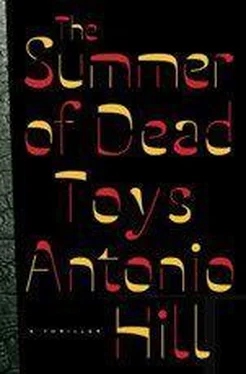Antonio Hill - The Summer of Dead Toys
Здесь есть возможность читать онлайн «Antonio Hill - The Summer of Dead Toys» весь текст электронной книги совершенно бесплатно (целиком полную версию без сокращений). В некоторых случаях можно слушать аудио, скачать через торрент в формате fb2 и присутствует краткое содержание. Жанр: Триллер, на английском языке. Описание произведения, (предисловие) а так же отзывы посетителей доступны на портале библиотеки ЛибКат.
- Название:The Summer of Dead Toys
- Автор:
- Жанр:
- Год:неизвестен
- ISBN:нет данных
- Рейтинг книги:4 / 5. Голосов: 1
-
Избранное:Добавить в избранное
- Отзывы:
-
Ваша оценка:
- 80
- 1
- 2
- 3
- 4
- 5
The Summer of Dead Toys: краткое содержание, описание и аннотация
Предлагаем к чтению аннотацию, описание, краткое содержание или предисловие (зависит от того, что написал сам автор книги «The Summer of Dead Toys»). Если вы не нашли необходимую информацию о книге — напишите в комментариях, мы постараемся отыскать её.
The Summer of Dead Toys — читать онлайн бесплатно полную книгу (весь текст) целиком
Ниже представлен текст книги, разбитый по страницам. Система сохранения места последней прочитанной страницы, позволяет с удобством читать онлайн бесплатно книгу «The Summer of Dead Toys», без необходимости каждый раз заново искать на чём Вы остановились. Поставьте закладку, и сможете в любой момент перейти на страницу, на которой закончили чтение.
Интервал:
Закладка:
16
As soon as they got to the station Héctor noticed that Leire had something to tell him, but before he had a chance to go over to her, Savall called him into his office. By his face, the meeting behind closed doors didn’t bode well, and Héctor mustered all his patience to get through the sermon, which he guessed related to Dr. Omar. However, he realized it wasn’t going in that direction on seeing that there was another person sitting in front of the super’s desk: a fair-haired woman, about fifty, who turned toward him and gazed at him intently. Héctor wasn’t surprised when Savall introduced them: he was sure she had to be Joana Vidal. She greeted him with a slight movement of her head and remained seated. Tense.
“Héctor, I’ve been informing Señora Vidal of your inquiries.” Savall’s tone was smooth, conciliatory, with a hint of warning. “But I think it’s better for you to tell her yourself.”
Héctor took a few seconds before speaking. He knew what the superintendent was asking of him: a neutral, friendly tale, and at the same time persuasive, which might convince this woman that her son had fallen from the window. The same argument a teacher would use with a pupil who has failed by one point: you can walk with your head held high, it is a worthy failure, come back in September and I’m sure you’ll pass. In Joana Vidal’s case, better to go and not come back. But at the same time, something told him that this woman, legs still crossed and clutching the arms of the chair tightly, was keeping an ace up her sleeve. A bomb she’d drop at the opportune moment, which would catch them all unawares, not knowing what to say.
“Of course,” he said at last, and fell silent again to weigh his words. “But first perhaps Señora Vidal has something to tell us as well.”
The woman’s quick glance told him he’d hit the nail on the head. Savall raised his eyebrows.
“Is that so, Joana?” he asked.
“I’m not sure. Perhaps. But first I want to hear what Inspector Salgado has to tell me.”
“Fine.” Now yes, thought Héctor, noting that the woman sitting beside him was relaxing a little. He moved his chair to see her face and spoke to her directly, as if the super wasn’t in the room. “From what we know, the night of the festival of San Juan your son and two of his friends, Aleix Rovira and Gina Martí, had a little party in Marc’s attic. The kids’ stories generally match: the party seemed to develop normally, until for some reason Marc’s mood changed, he turned off the music and argued with Aleix when he accused him of coming back very much changed from Dublin. Aleix went home, but Gina, who was rather drunk, stayed over in Marc’s room. His anger had affected her as well, and as soon as Aleix left he sent her to bed, telling her she was drunk, which annoyed the girl. Then she lay down and fell asleep immediately. For his part, Marc stayed alone in the attic and did as he usually did: smoked a last cigarette sitting on the window sill.”
He stopped there, although this woman’s face showed only concentration. Not sorrow or pain. There was something Nordic about Joana Vidal’s features, an apparent coldness that might or might not be a mask. It was, thought Héctor; but it was a mask that had been in place for a long time and was beginning to merge with the original features. Only her eyes, an even dark chestnut color, seemed to contradict it; they hid a sparkle that, in the right circumstances, could be dangerous. Unable to help it, he mentally compared Joana to Enric Castells’ second wife and told himself there was a superficial likeness, a pallor common to both women; however, the similarities ended there. In Glòria’s eyes there was doubt, insecurity, even obedience; Joana’s hinted at rebellion and challenge. There was no doubt that Castells hadn’t wanted to run the same risk twice and had chosen a softer, more docile woman. More manageable. Héctor Salgado told himself that the woman in front of him deserved to know the truth and went on in the same tone, ignoring the expression of impatience coming over the super’s face.
“But the kids are lying, at least partly. I’m not saying they had anything to do with what happened,” he clarified. “Only that there’s a part of the story they’ve smoothed over, if I might put it that way.” He went on to refer to what Castro had discovered on seeing the photos on Gina’s Facebook profile, as well as the finding of the T-shirt Marc was wearing during the party: clean but with some stains that might well be blood. “So the next step is to question Aleix Rovira closely’-he said this without looking at Savall-“because the alleged fight they’ve told us about may have been somewhat more violent than the story suggests. And speak to Aleix’s brother to confirm once again that the boy arrived home and didn’t go back out. Honestly, I think that is the most likely thing. Perhaps that’s all that happened, a fight between friends, nothing too serious but enough for Marc to stain his T-shirt and change his clothes. A fight that maybe caused Marc’s laptop to fall to the floor and break. .”
He remained thoughtful. Why hadn’t Gina said anything about the broken laptop? Even if it was a matter of a simple argument, as she said, it was less suspicious to tell them something they would find out anyway. He forced himself to slow down: his thoughts were moving too quickly and he should continue. “It doesn’t change what happened afterward,” he said, but his voice didn’t sound too convincing. “Only that we need some pieces to complete the picture. For the moment we’ve taken Marc’s laptop and mobile to see what we can extract from them. And we should question Aleix Rovira again.” Then he did look at the super. He was pleased to see he was nodding, although with a bad grace. “And now, is there something you wish to tell us, Señora Vidal?”
Joana uncrossed her legs and searched in her bag until she pulled out some folded pages. She kept them in her hand as she spoke, as if she didn’t want to part with them.
“A few months ago, Marc got in contact with me by email.” It was difficult for her to say it. She cleared her throat and threw her head back: she had a long, white neck. “As you must already know, we hadn’t seen each other since I left, eighteen years ago. So it was a complete surprise when I received his first message.”
“How did he get your address?” asked the super.
“Fèlix, Enric’s brother, gave it to him. It may seem strange to you, but we’ve kept in touch all this time. With my exbrother-in-law, I mean. Do you know him?” she asked, turning to Héctor.
“Yes, I saw him yesterday at your ex’s house. He seemed to love his nephew very much.”
She nodded.
“Well, Enric is a busy man.” She shook her head. “No, I have no right to criticize him. I’m sure he did everything he could. . but Fèlix has no family other than that of his brother and he’s always worried a lot about Marc. Either way, the fact is I received an email at the beginning of the year. From. . my son.” It was the first time she’d said it and it hadn’t been easy for her. “I was very surprised. Of course something like that could have happened at any time, but the truth is I wasn’t expecting it. You never expect it.”
Silence fell, which Savall and Héctor dared not break. She did.
“At the beginning I didn’t know how to answer him, but he persisted. He sent me two or three more emails and I couldn’t refuse any longer, so we started to write to each other. I know it sounds strange, I can’t deny it. A mother and her son, who have practically never seen each other, communicating by email.” She flashed a bitter smile at them, as if she were challenging them to make the smallest comment. Neither of them opened their mouths. She continued: “I was afraid of the questions, reproaches even, but there were none. Marc just told me things about his life in Dublin, his plans. It was as if we’d just met, as if I wasn’t his mother. The correspondence continued for about three months, until. .” She was quiet for a few moments and looked away. “Until he suggested coming to see me in Paris.” She lowered her eyes to the pages she had in her hand. “The idea terrified me,” she said simply. “I don’t know why. I said I had to think about it.”
Читать дальшеИнтервал:
Закладка:
Похожие книги на «The Summer of Dead Toys»
Представляем Вашему вниманию похожие книги на «The Summer of Dead Toys» списком для выбора. Мы отобрали схожую по названию и смыслу литературу в надежде предоставить читателям больше вариантов отыскать новые, интересные, ещё непрочитанные произведения.
Обсуждение, отзывы о книге «The Summer of Dead Toys» и просто собственные мнения читателей. Оставьте ваши комментарии, напишите, что Вы думаете о произведении, его смысле или главных героях. Укажите что конкретно понравилось, а что нет, и почему Вы так считаете.












